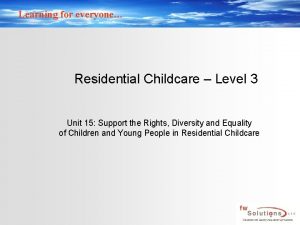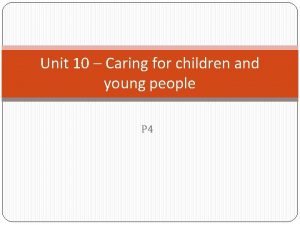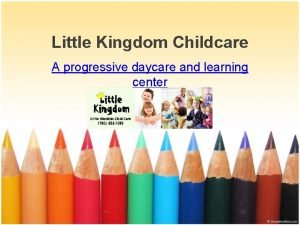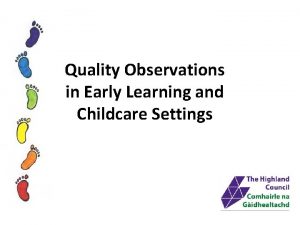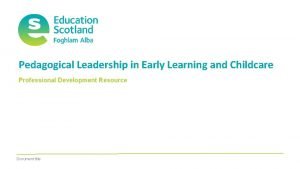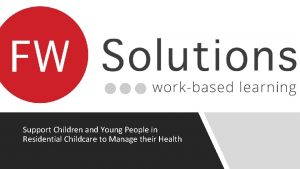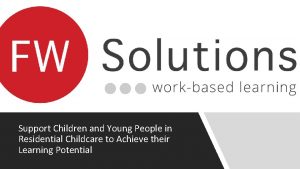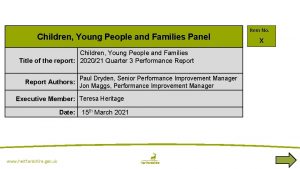Support Children and Young People in Residential Childcare








- Slides: 8

Support Children and Young People in Residential Childcare to Manage their Health

AIMS AND OBJECTIVES ØThe aim of this presentation is to deliver a deeper and wider understanding of how you can contribute to the support of looked after children's health issues and how you can ensure that every child within your care is subjected to the statutory guidelines contained within this presentation and accompanying support pack (DH Statutory Guidelines) Øyou will develop a greater and wider skill set that will demonstrate understanding of the health service provision that supports children in care

Statutory Guidance Ø Health Assessment: - It is the responsibility of the local authority to make sure that health assessments are carried out for every looked after child. Ø Each child or young person should have a holistic health assessment on entering care. Ø This first assessment should be undertaken by a registered medical practitioner in accordance with the Care Planning, Placement and Case Review Ø The first health assessment should result in a health plan by the time of the first review of the child’s care plan, four weeks after becoming looked after. Ø Successful health assessments will require a flexible and child-centred approach, appropriate to the child or young person’s age and stage of development.

Statutory Guidance Ø Child and Adolescent Mental Health Services: Child and Adolescent Mental Health Services (CAMHS) play a crucial role in assessing and meeting the child’s mental health needs identified as part of the screening process. Ø Children with behavioural, emotional and social difficulties, should be confident that: Ø their mental health needs will be assessed alongside all their other needs, no matter where the need is initially identified. Ø an individualised package of care is available to them so that their personal circumstances and the particular settings where they receive their primary support, appropriately influence the mental health care and support they receive.

Statutory Guidance Ø Health Plans: every looked after child has a health plan which forms part of their care plan. Ø The health plan should clearly set out the objectives, actions, timescales and responsibilities, arising from the health assessment. Ø The health plan should be reviewed in line with the statutory review timescales. Ø Health assessments must be undertaken twice a year for children under 5 years, and annually for children and young people 5 years and over. Ø The health plan should be drawn up in conjunction with a health care professional, and with the child’s parents whenever practicable.

Impacts on young people in residential childcare Ø Statistics have shown that 2 out of 3 of all looked after children had at least one physical health complaint. Ø Looked after children are more likely than their peers to experience problems including speech and language problems, bedwetting, co‑ordination difficulties and eye or sight problems. Ø Studies of young people leaving care typically report that their health concerns are similar to those of young people outside the care system (such as smoking, sexual health and STIs). Ø Unlike most of their peers, they have to deal with such problems while learning to live independently

Impacts of young people in residential care ØA recent report (The Independent-04/16) states: ‘Children in care too often being denied access to mental health services - despite being four times more likely to have a diagnosable condition than their peers’. One girl was denied care due to her not having a “settled placement” as she had been moved over 13 times. ØAlmost half of the children and young people in care have a diagnosable mental health disorder compared with around one in 10 children who are not. ØDenial of services detrimental to the well-being of children in care, it can be devastating and lead to severe consequences

Discussion activity Over to you… Describe factors that may jeopardise access to health services for children and young people Describe ways to help children and young people overcome barriers to accessing health service provision
